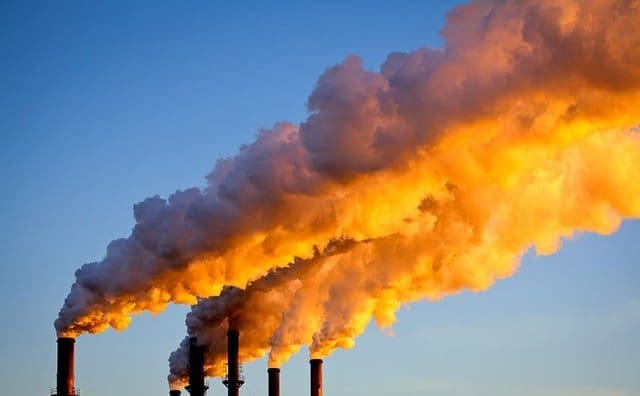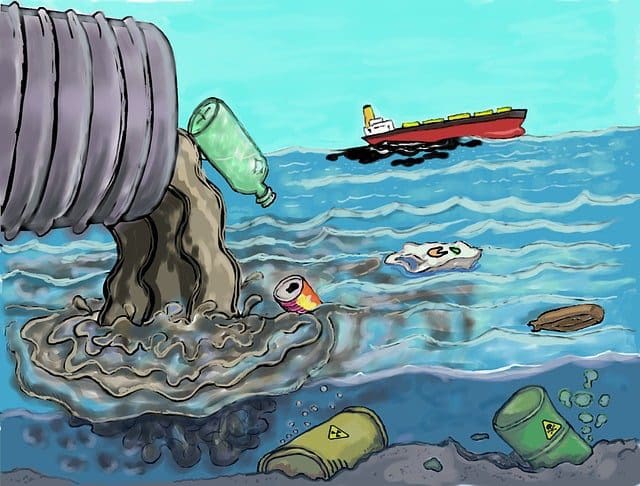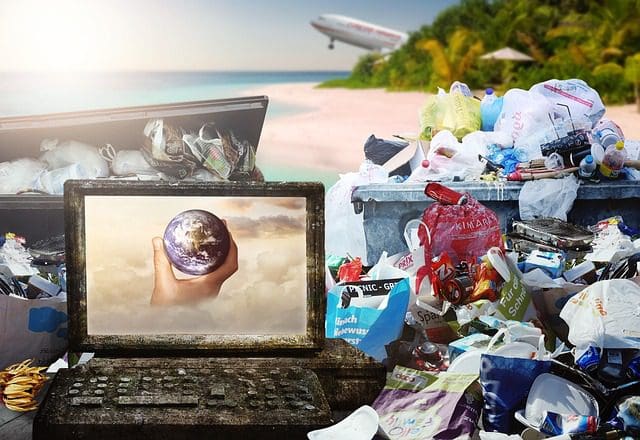Why CO2 must have a price
Opinion blog by André Grossen
Carbon dioxide is a natural component of our air. At the same time, it is a driver of global warming and thus one of the greatest challenges of our time. However, the invisible waste product of our consumer society has no price and climate-damaging behaviour is often financially rewarded. The author of this blog is convinced that CO2 urgently needs a prize.

Man, our planet and its resources
Since the first human civilisations, nature has formed the basis of our economy. Agriculture enabled humans to have a better nutritional basis and thus the foundation for ever larger civilisations and cities. While humans lived with nature for thousands of years, today they live off nature. With the advancing scientific understanding of nature and ecological interrelationships, it was possible for mankind to intervene in more and more natural systems and to make use of them in isolation. Improved agricultural techniques enabled our species to grow in previously unimaginable ways. In 1900, more than 1.65 billion people already populated the earth - a figure that will roughly quadruple to 6.15 billion in the course of the 20th century. In November 2022, the world population already exceeded the 8 billion mark. Resource consumption is becoming less and less sustainable. The shaping of previously wild nature into the most economically efficient use possible is having a catastrophic effect on biodiversity and the natural systems of our planet. Since the mid-1970s, humanity's ecological footprint has exceeded what our planet could sustain in the long term. In Switzerland, we are now three times higher! Climate change is only one of the many symptoms resulting from our excessive consumption of natural resources. But it is in itself one of the greatest challenges of our time.

Steering works, three examples
Until the middle of the last century, we disposed of human and industrial waste directly into our lakes. Swiss waters were heavily polluted, diseases spread. The fact that the cleanliness of our waters has improved greatly since then is thanks to environmental protection guidelines and, above all, sewage treatment plants. Today, we take the purification of our wastewater for granted and are proud of our clean waters and the fact that we can swim in the Rhine, the Aare or the Reuss without any health concerns.
Since the 1980s, most Swiss municipalities have introduced charges for their waste. This led to strong reactions. Nobody likes to pay for something that was previously free. The effect is clear: once a municipality has introduced the sack fee, combustible waste decreases by 30 percent on average. At the same time, the amount of recycled waste increases by the same percentage. Today, there is hardly any discussion about waste fees.
When the Swiss wholesalers started charging five centimes for plastic bags at the checkout as the smallest possible step towards sustainability, the outcry was great. The effect: 80 per cent fewer plastic bags are used. With 95 kilograms of plastic waste per year, Switzerland is still at the top of the European list of plastic wasters. And it is not only in the case of plastics that action is required. The average lifespan of a smartphone is well under three years. Other technical devices are also thrown away far too quickly. In the case of disposable vapes, which are becoming increasingly popular, especially among the younger generation, a battery ends up in the rubbish for a few puffs of cigarette substitute (far too rarely to be recycled).
These former and current problem areas all have one thing in common: we see them and perceive them. In the case of traffic, for example, action is taken when people are too annoyed by the smell of sulphur dioxide (a waste product of road traffic). Because we see CO2 not perceive directly, there is little social pressure for regulation.

The invisible waste of consumer society
Carbon dioxide, short CO2, is a natural component of our air. The gas is odourless, invisible, water-soluble (when mixed with water it produces carbonic acid), non-flammable and intrinsically non-toxic. It is produced, among other things, through the combustion of fossil fuels or through the respiration of living beings. Carbon dioxide occurs naturally in the earth's atmosphere. Once there, however, unlike other substances, it does not break down by itself. But CO2 is not only created by natural processes. Humans have been releasing more and more of it through the combustion of fossil fuels since industrialisation. The CO2 concentration in the atmosphere has been steadily increasing ever since. Carbon dioxide is the most important known greenhouse gas and is largely responsible for climate change. Other gases also contribute to the greenhouse effect. For the sake of simplicity, these are often referred to as CO2-equivalents (CO2eq). Thus, one unit of methane corresponds to about 28 CO2eq.
The expected consequences of climate change are reminiscent of apocalyptic novels: glaciers are melting, sea levels are rising, oceans are acidifying, soils are becoming saline, groundwater levels are sinking, desert areas are spreading and biodiversity is dwindling. Since the greenhouse effect has been sufficiently scientifically proven, international politics has been trying for years to reduce global warming by reducing CO2-emissions.

A small step towards cost equity
One of the reasons why many people ignore the dramatic consequences of this waste product of the human way of life is obvious. We see, smell and taste CO2 not. Carbon dioxide does not care whether we believe in its effects or not. It accumulates in our atmosphere and causes changes whose consequences our descendants will have to deal with for millennia.
In order to behave in a more environmentally friendly way, there is the well-known slogan: Reduce, Reuse, Recycle. Unfortunately, well-intentioned appeals are not enough to make people and industry change their behaviour in the long term. One approach, on the other hand, has proven itself time and again, whether for household waste or for the Raschelsäckli in the wholesalers: The incentive tax.
Pollution is not included in the costs today. CO2-emissions must mandatorily and universally be given a price. This is not theft from companies and the population, but a small step towards cost justice. If the ecological and economic consequences of our behaviour were included in the calculations, we would be forced to rethink our behaviour, whereas today climate-damaging behaviour is far too often financially rewarded. Flights would no longer compete with the expensive high-speed train connections built throughout Europe on short and medium-haul routes. Energy from coal-fired power plants would no longer be cheap and would not further delay the long overdue shift to renewable energy. Cruises would not be a cost-effective alternative for family holidays (a week's cruise causes as many CO2emissions as a 9000-kilometre car journey). But even in everyday life, many small decisions would be positively influenced in favour of the climate. Meat, for example, would perhaps go into the pot a little less. Incentive taxes work, so we need them as a piece of the puzzle to slow down climate change.

Solutions instead of solutionism
The increasingly powerful artificial intelligences form the basis for a new ideology: solutionism. All of the world's problems can be solved if we just hand over enough data (big data) to an algorithm that calculates the best solution for us. E-fuels, synthetic meat and CO2-sucking machines would solve the climate crisis without us having to question or even adapt our behaviour. There is a big catch: we trust that artificial intelligence will find a solution. Currently, political forces in Switzerland are already promoting new nuclear fusion technologies as a solution to the energy question, even though the technology only exists on paper and in experimental status to date and is miles away from general application. This puts into perspective the urgency of advocating sustainable and environmentally friendly energies today.
Technological progress and innovation, used in a targeted manner, can contribute to overcoming the climate crisis. But they are not godlike saviours that absolve us of our personal responsibility. Only the immediate, long-term and significant reduction of CO2 is effective climate protection, not the vague hope of a technical solution.

CO2 needs a price
Today, climate-damaging behaviour too often has no price. However, those who want to behave more sustainably reduce their own CO2-emissions voluntarily. Since we cannot (yet) reduce all our emissions to net zero, there is the voluntary CO2-Voluntary Carbon Market (VCM). In the absence of government regulation, climate protection projects such as the energy-efficient cookers from ADES can be supported on a voluntary basis. In the case of ADES, not only are emissions saved, but a whole range of additional positive effects for people, flora and fauna in Madagascar are made possible. It is essential that the control mechanisms are effective and that realistic figures are used. But we will take a closer look at what the VCM is exactly and how it works in the next blog article.

